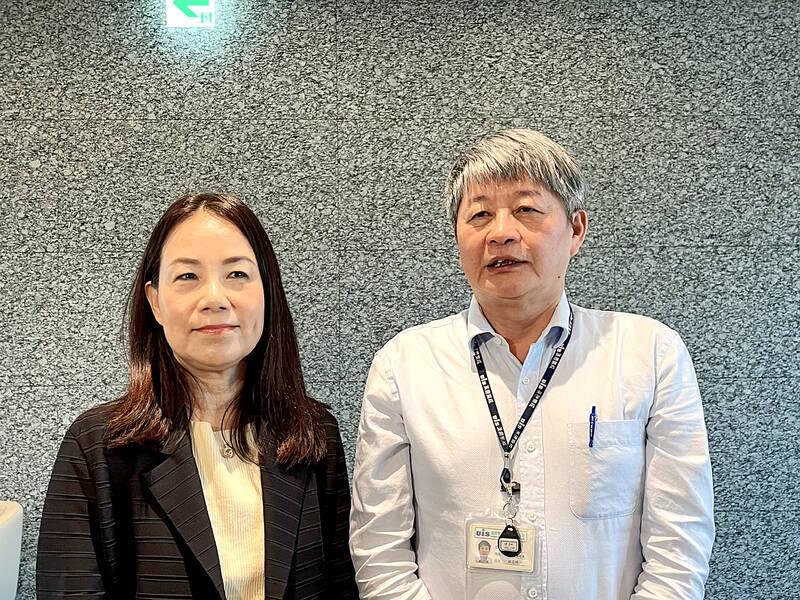United Integrated Services Co (UIS, 漢唐), which helps Taiwan Semiconductor Manufacturing Co (TSMC, 台積電) build chip manufacturing facilities and install clean rooms, yesterday delivered an upbeat revenue outlook for the year, citing robust demand for chipmaking capacity expansion.
The company told shareholders it expects revenue to surpass last year’s, driven by deepening partnerships with TSMC on new 2-nanometer fabrication plants and advanced chip packaging facilities using chip-on-wafer-on-substrate technology in Taiwan, amid surging demand for artificial intelligence chips.
“With company revenue showing year-over-year growth in April and May, we are holding an optimistic view about the rest of this year. That is based on the orders we have confirmed,” UIS chairwoman Belle Lee (李惠文) told reporters on the sidelines of the company’s annual shareholders’ meeting in New Taipei City.

Photo: Grace Hung, Taipei Times
UIS posted NT$4.98 billion (US$166.25) in revenue last month, up 28.03 percent from a year earlier, while cumulative revenue for the first five months rose 3.14 percent year-on-year to NT$20.51 billion, company data showed.
The company has also made headway in expanding its operations in Arizona, Japan’s Kumamoto and Singapore. Major clients include TSMC and US memory chipmaker Micron Technology Inc.
“In the US, as our customer has confirmed, they are proactively advancing construction of the phase-two facilities. We have received new orders to begin work on the fab,” UIS president Lai Chih-ming (賴志明) told reporters.
The new orders cover a broader range of construction categories than the previous agreement, including clean room installations, mechanical and electrical engineering, specialized equipment setup, and the installation of water and gas piping systems, Lai said.
As its key customer is doubling down on its investment in the US, UIS plans to double its US workforce from 100 to about 200 employees, with a significant portion of the new hires coming from local communities.
In addition to its US projects, UIS is also handling clean room installations in Singapore for VisionPower Semiconductor Manufacturing Co Pte Ltd, a joint venture between contract chipmaker Vanguard International Semiconductor Corp (世界先進) and NXP Semiconductors NV.
Although the US’ tariffs policy would raise the cost of equipment and materials such as steel tubes, the impact should be manageable as those materials account for a limited share of their total construction costs, Lai said.
The company is less at risk of foreign exchange rate volatility due to its minimal exposure to the US dollar, Lee said.
“As we are not an export-oriented company, we hold a scant US-dollar position,” she said.
UIS shareholders yesterday gave the go-ahead to a proposed cash dividend distribution of NT$28 per common share. That represents a payout ratio of 85 percent based on the company’s earnings of NT$32.94 per share last year.

UNCERTAINTIES: Exports surged 34.1% and private investment grew 7.03% to outpace expectations in the first half, although US tariffs could stall momentum The Chung-Hua Institution for Economic Research (CIER, 中華經濟研究院) yesterday raised its GDP growth forecast to 3.05 percent this year on a robust first-half performance, but warned that US tariff threats and external uncertainty could stall momentum in the second half of the year. “The first half proved exceptionally strong, allowing room for optimism,” CIER president Lien Hsien-ming (連賢明) said. “But the growth momentum may slow moving forward due to US tariffs.” The tariff threat poses definite downside risks, although the scale of the impact remains unclear given the unpredictability of US President Donald Trump’s policies, Lien said. Despite the headwinds, Taiwan is likely

When Lika Megreladze was a child, life in her native western Georgian region of Guria revolved around tea. Her mother worked for decades as a scientist at the Soviet Union’s Institute of Tea and Subtropical Crops in the village of Anaseuli, Georgia, perfecting cultivation methods for a Georgian tea industry that supplied the bulk of the vast communist state’s brews. “When I was a child, this was only my mum’s workplace. Only later I realized that it was something big,” she said. Now, the institute lies abandoned. Yellowed papers are strewn around its decaying corridors, and a statue of Soviet founder Vladimir Lenin

UNIFYING OPPOSITION: Numerous companies have registered complaints over the potential levies, bringing together rival automakers in voicing their reservations US President Donald Trump is readying plans for industry-specific tariffs to kick in alongside his country-by-country duties in two weeks, ramping up his push to reshape the US’ standing in the global trading system by penalizing purchases from abroad. Administration officials could release details of Trump’s planned 50 percent duty on copper in the days before they are set to take effect on Friday next week, a person familiar with the matter said. That is the same date Trump’s “reciprocal” levies on products from more than 100 nations are slated to begin. Trump on Tuesday said that he is likely to impose tariffs

HELPING HAND: Approving the sale of H20s could give China the edge it needs to capture market share and become the global standard, a US representative said The US President Donald Trump administration’s decision allowing Nvidia Corp to resume shipments of its H20 artificial intelligence (AI) chips to China risks bolstering Beijing’s military capabilities and expanding its capacity to compete with the US, the head of the US House Select Committee on Strategic Competition Between the United States and the Chinese Communist Party said. “The H20, which is a cost-effective and powerful AI inference chip, far surpasses China’s indigenous capability and would therefore provide a substantial increase to China’s AI development,” committee chairman John Moolenaar, a Michigan Republican, said on Friday in a letter to US Secretary of